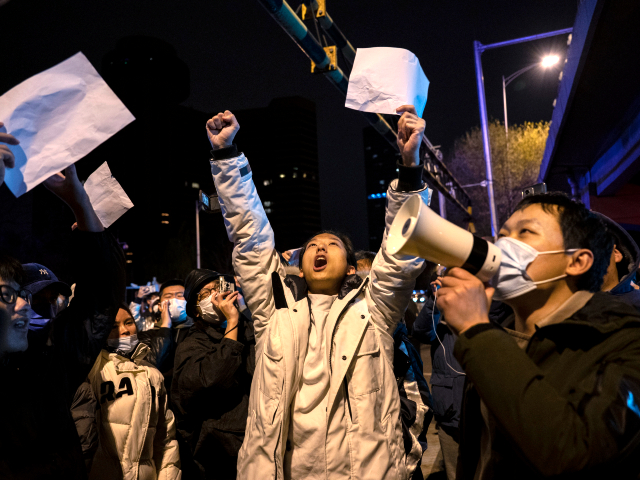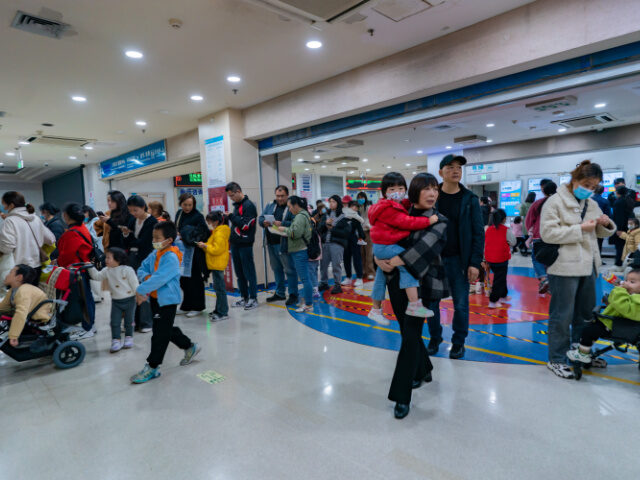Chinese state newspaper Global Times acknowledged a surge in respiratory disease in the country, particularly among children, which has alarmed international observers – but blamed it on an “immunity gap” in the population, caused by China’s brutal “zero-covid” lockdowns.
China – particularly in Shanghai, Beijing, and much of the cold northeast – began experiencing a surge in child hospitalizations in early November, prompted by various pathogens causing respiratory disease. Chinese authorities claim that most cases of child pneumonia being diagnosed are the products of infections with influenza virus, adenovirus, respiratory syncytial virus (RSV), or bacterial mycoplasma pneumonia. Influenza and RSV, in particular, tend to cause much more severe infections in children than adults.
Chinese hospitals in the nation’s largest cities have been struggling to keep up with demand as panicked parents bring their children in for diagnosis.
“I brought my kid to Beijing Children’s Hospital a few days ago. It was fully packed,” a mother told the Global Times. “There were 300 people in front of us waiting. We waited four hours until afternoon to see a doctor.”

Parents with children who are suffering from respiratory diseases are lining up at a children’s hospital in Chongqing, China, on November 23, 2023 (Photo by Costfoto/NurPhoto via Getty Images).
The situation has caused international alarm in light of a similar outbreak of disease in 2019 in Wuhan, which authorities later admitted was caused by a novel virus that prompted a pandemic, killing millions of people.
The World Health Organization (W.H.O.) demanded more information from the Chinese Communist Party this week on the rising number of respiratory hospitalizations. Following consultations with the communists, the W.H.O. insisted in a statement on Thursday that it had no evidence of any new diseases circulating in China.
“In the current outbreak of respiratory illness, the reported symptoms are common to several respiratory diseases and, as of now, at the present time, Chinese surveillance and hospital systems report that the clinical manifestations are caused by known pathogens in circulation,” the W.H.O. said in a statement. “Mycoplasma pneumoniae is a common respiratory pathogen and a common cause of paediatric pneumonia, and is readily treated with antibiotics.”
While the pathogens causing disease are “common,” the Global Times conceded that the hospital overcrowding and documented number of child disease cases are not and offered as an answer that China’s mandatory lockdowns, forced imprisonment of thousands of people in quarantine camps, and other barbaric measures against the Wuhan coronavirus could have led to the nation’s children being exposed to fewer diseases on a regular schedule – and left them with weaker immunity.
Citing respiratory disease expert Wang Guangfa, the state propaganda outlet conceded:
The prevalence of respiratory illnesses this winter seems more noticeable than previous years, one of the key reasons being the rise of an ‘immunity gap’ resulting from decreased antibodies against these pathogens among the general public due to the protective precautions taken in the past three years.
The medical publication Stat News quoted infectious disease experts who agreed with the suggestion that China’s lockdowns left people’s immune systems, particularly those of children, vulnerable to other respiratory illnesses.
“Other countries, including the U.K., experienced big waves of respiratory infections and hospitalizations in kids during their first winter after pandemic restrictions had been lifted,” Stat News quoted Francois Balloux, director of the University College London’s Genetics Institute, as saying in a statement.
“Since China experienced a far longer and harsher lockdown than essentially any other country on earth, it was anticipated that those ‘lockdown exit’ waves could be substantial in China,” he observed.
Stat News named RSV as a pathogen of particular concern in the West shortly after the lifting of coronavirus civil rights restrictions, which were far less invasive than China’s.
The Chinese Communist Party imposed a policy of “zero-Covid” on the entire country from late January 2020 to December 2022. The policy consisted of locking down entire cities – trapping people in a state of house arrest, often without food and water – in response to small numbers of confirmed coronavirus cases. Chinese authorities also forced people considered potential contacts of confirmed coronavirus patients into densely packed quarantine camps, often separating children from their parents and otherwise violating the rights of their citizens.
The “zero-Covid” policy ended after a wave of protests attracting tens of thousands of people nationwide erupted in late November 2022. The protests increased in frequency after ten people died in a fire in Urumqi, occupied East Turkistan, after “zero-Covid” policies kept firefighters from approaching the fire. The government claimed it was “optimizing” its policies by doing away with city-wide lockdowns in response to new variants of the Wuhan coronavirus, denying the protests entirely.

Protesters shout slogans during a protest against China’s strict zero COVID measures on November 28, 2022, in Beijing, China (Kevin Frayer/Getty Images).
The Global Times claimed on Thursday that China’s poor handling of the outbreak of the Wuhan coronavirus in 2019 – including refusing to admit that the virus was transmissible, hosting a banquet with shared food for 130,000 people, and letting five million people travel out of Wuhan during an outbreak – should somehow result in the international community trusting China to handle the situation well.
“We shouldn’t cast doubt on China’s capability to monitor epidemic trends or respiratory diseases. More science studies will be needed to judge if there are any unknown reasons for these respiratory diseases,” the Global Times quoted an expert as demanding.

COMMENTS
Please let us know if you're having issues with commenting.